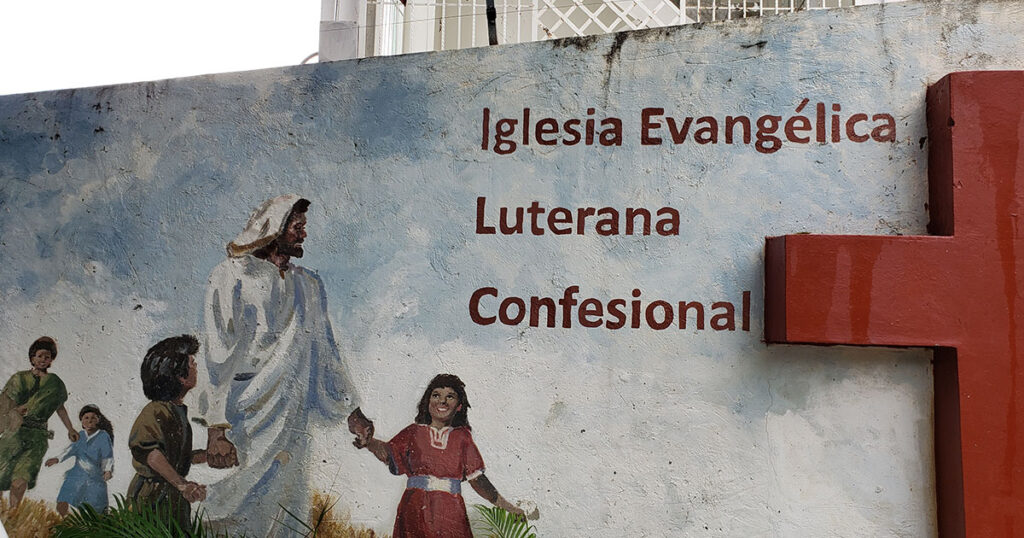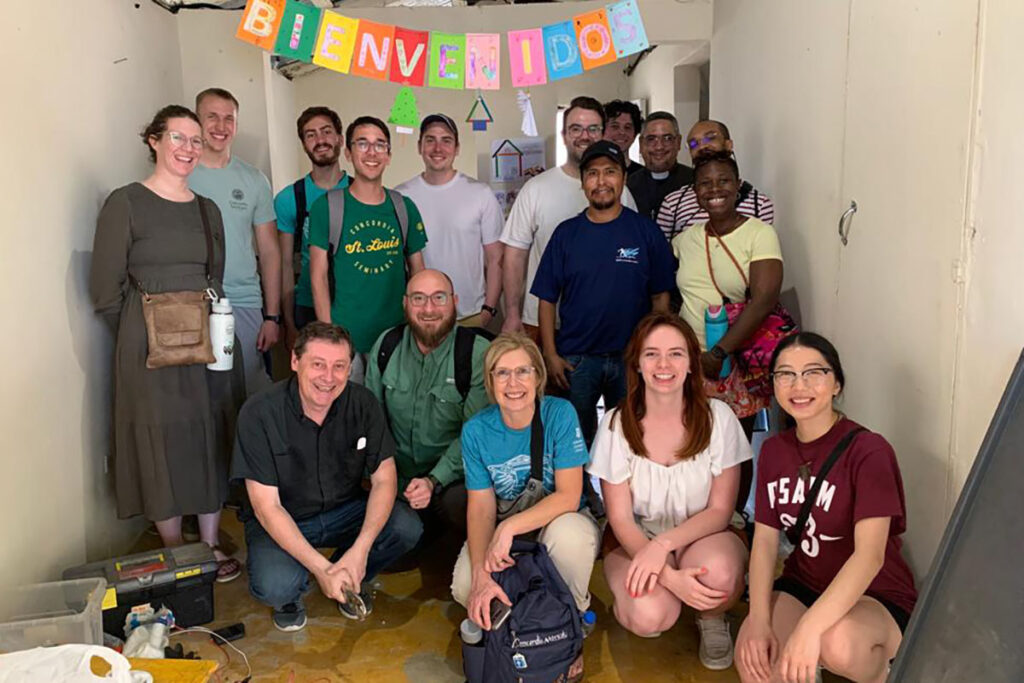
A mural of Jesus with children is painted outside of a church in the town of Palmar Arriba in the Dominican Republic. A group of Concordia Seminary, St. Louis students were in the Dominican Republic in January 2024 on a short-term mission trip coordinated by LCMS International Mission. (Photo courtesy of Jason Groth.)
By Jason Groth, LCMS short-term mission team member
In January 2024, I had the opportunity to travel to the Dominican Republic on a short-term mission trip through The Lutheran Church—Missouri Synod’s Office of International Mission.
As I prepared for the trip, I expected to be challenged by several things. I expected to carefully navigate a foreign land and people. I expected to see new sights, smell new smells and hear new sounds. I expected to be spoken to and not understand. I expected to speak and not be understood. I expected to be uncomfortable. I expected to tell people about Jesus and invite them to know Him. Those were some of my expectations when preparing to go to the Dominican Republic.
There were other things I did not expect. I did not expect to find the familiar in the unfamiliar. I did not expect to speak and find people eager to understand. I did not expect to be able to follow the thread of the conversation in a foreign language. I did not expect to identify with people who have had very different experiences than I have. I did not expect to hear people speak of Jesus and invite me to know Him better.
You may agree or disagree with my expectations. You may think I should have expected some of the things I did not expect. You are probably right. Regardless of my cluelessness, I saw and heard amazing things in the Dominican Republic. I walked away with insights about the nature of the church, the mission of God to reconcile people to Himself – and myself.
In this article, I will explore these three takeaways.
1. God’s global church
The church is much bigger and more beautiful than we recognize. The sheer expansiveness of it is incredible. The fact is that the church, with all of its particularities, has the same universal components. The worship of Jesus is central. People are baptized with water. The Lord’s Supper is given under bread and wine. Churches look and sound different, but the Church grows and thrives around the means of grace wherever it is found.
The church, biblically, is the gathering of all believers. Where people gather is important. The church has used many types of places in its long history: Houses. Barns. Fields. Basements. Catacombs.
As modern American Christians, we often think of a church as a wood or brick building with a steeple and a cross on top. The places mentioned earlier serve as examples of other places the church might gather to hear the Gospel and receive God’s gifts in the Sacraments.
In the Dominican, church plants often meet in a house or several houses to begin with. They quickly move from that space to something larger. If resources allow, the congregation moves to a space dedicated to gathering and being the church.
While meeting in houses or under a big tree may be where a church begins, congregations almost always desire to set apart a space dedicated to the function of a church. The church in any locality finds its preferred expression in a space devoted to people gathering to receive the Word and Sacraments.

A group of Concordia Seminary, St. Louis students went to the Dominican Republic on an LCMS International Mission short-term mission trip in January 2024, when they met with LCMS missionaries in the town of Barrio Cienfuego. (Photo courtesy of Erin Mackenzie.)
2. The mission of the church
Projects of mercy and human care often come to mind when we say “mission.” Caring for our neighbors is what Christians do, but is it a Christian mission? Yes and no.
Yes, caring for people is good, right and salutary work for the followers of Christ. However, we cannot say that just showing love and kindness is the Christian mission. Any organization can organize a health clinic, dig a well or build a house. If mission involves purely human care, then Doctors Without Borders is a Christian mission organization.
No, because Christian mission must have something that distinguishes it from other forms of human care. What is that distinction? What does Christian mission work deliver that Doctors Without Borders and others cannot provide?
Christian mission work is characterized by the essential delivery of the Word of Christ for the reconciliation of people. This distinctiveness sets it apart from general human care. While this may appear obvious, it hasn’t always been evident in many short-term trips organized by American churches.
I do not intend to accuse or condemn any short-term trips to volunteer at health clinics, distribute aid or clothing or build houses. As I said, these are good, right and salutary things to be engaged in. At the same time, it must be recognized that these things, while good, do not walk an unbelieving person to the side of faith and life in Christ Jesus.
As Lutherans, we have an advantage. We believe, teach and confess that only one thing can convert a person: the Gospel. Luther masterfully explains this in the explanation of the third article of the Apostles’ Creed:
I believe that I cannot by my own reason or strength believe in Jesus Christ, my Lord, or come to Him; but the Holy Spirit has called me by the Gospel, enlightened me with His gifts, sanctified and kept me in the true faith. In the same way He calls, gathers, enlightens, and sanctifies the whole Christian church on earth, and keeps it with Jesus Christ in the one true faith. In this Christian church He daily and richly forgives all my sins and the sins of all believers. On the Last Day He will raise me and all the dead, and give eternal life to me and all believers in Christ.
luther’s small catechism
This is most certainly true.
It is the Holy Spirit who gives faith “by the Gospel.” Consequently, if we are to call something a mission trip, while it can include acts of mercy and human care, it must necessarily include the Gospel.
What is the Gospel? Asking that question can garner a variety of different answers. I answer the question this way: Jesus came down to earth and lived a perfect life as a man free from sin, and He died and rose from the grave for the forgiveness of our sins.
The proclamation of this Word of Christ brings people from death to life, from darkness to light and from unbelief to belief. The proclamation of the Good News of Christ does something that a new set of glasses, a vaccination or even a new house does not do. It has the power to deliver eternal life. That is what mission is. That is what mission does. Truly Christian mission delivers Jesus, and where Jesus is, there is life.
Once the Gospel is proclaimed and someone is moved by the Holy Spirit to believe in Jesus, what then? What is the next logical step for a new believer? Think about it. If you told an unbeliever about Jesus and he wanted to know more, what would you do?
You might offer to read the Gospel accounts in the New Testament with someone. Great! Let’s say this person reads from the Gospels and professes, “Yes, I believe in this Jesus.” What next? The next step is baptizing and teaching the faith.
Jesus said:
“Go therefore and make disciples of all nations, baptizing them in the name of the Father and of the Son and of the Holy Spirit, teaching them to observe all that I have commanded you. And behold, I am with you always, to the end of the age.”
Matt. 28:19–20
Jesus commissions His disciples and, by extension, His church to baptize and teach the faith. That is the Church’s essential function. A church without preaching, teaching and Sacraments has lost its raison d’être – its most important purpose.
Christian mission can have features of human care and mercy. However, these things are part of more excellent human care and mercy, proclaiming Christ crucified for our sins and raised for our justification before God. As the Holy Spirit does His work and people are brought to faith, Christian mission has only done part of its job if it leaves people in that state.
Christian mission finds its ultimate end in bringing new believers to the church where they can be baptized and taught the faith, hear the Gospel proclaimed, and receive the gift of God, the very presence of his Son, in the Lord’s Supper.
Christian mission gives people the church, and the church gives people Jesus. In the Dominican Republic, I found that Christian mission is more than just physical acts of mercy, though those are important.
Christian mission finds its fulfillment in gathering people to the church, where they encounter Jesus in a concrete, external way through Word and Sacrament.
3. What I learned about myself
I entered the trip with certain expectations, particularly the excitement of sharing the message of Jesus with people. However, I found that the trip was more for me than for anyone I met. I heard the Gospel proclaimed to me. I was drawn yet again into the adventure that is the Christian life, the life of a follower of Jesus.
In the same way that I had expectations about the Dominican trip, I have expectations about my life. More accurately, I have expectations about how I want my life to go. The trip showed me that those expectations sometimes get in the way of what Jesus wants for my life.
On the trip to the Dominican Republic, I discovered that I would rather take 100% of the appointments that Jesus has set up for me to walk with Him on His mission of redeeming and restoring creation than have all my expectations and wants met. In short, I discovered that I’m open to things I might not have been open to before.
I highly encourage you to explore the possibility of taking a short-term trip to the mission field in Latin America and the Caribbean. This experience will open your mind and heart to the beautifully expansive nature of the church, the true essence of Christian mission and your place in God’s story.
Before you go, I have a suggestion: Leave your expectations at home, and then be open to unplanned appointments to join in what Jesus is doing in that place and in you.
To explore current opportunities to serve on a short-term mission trip with LCMS International Mission, visit servenow.lcms.org.